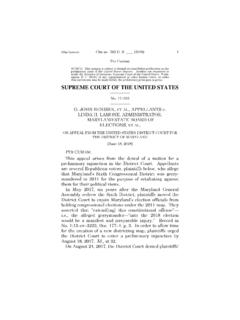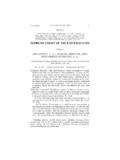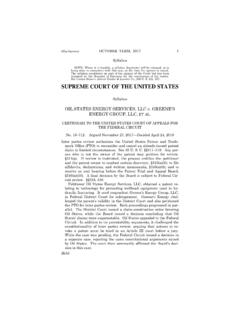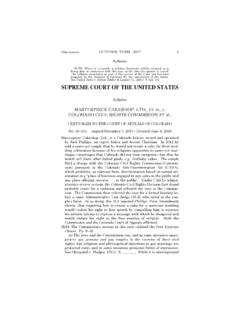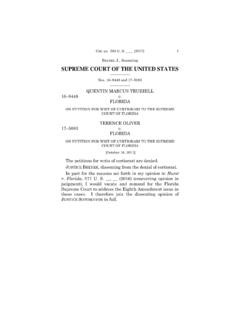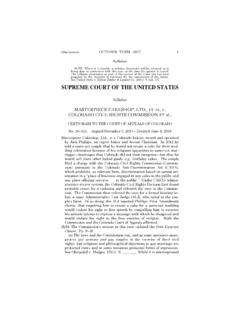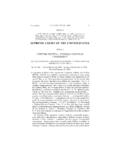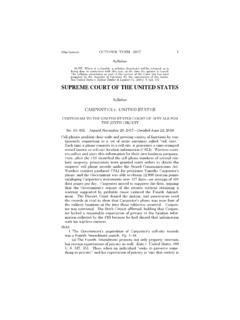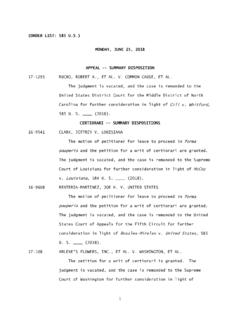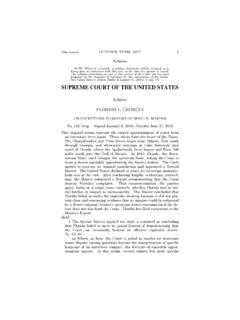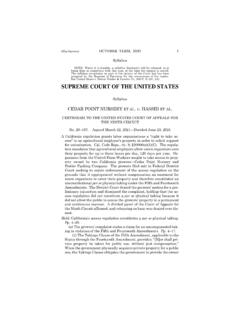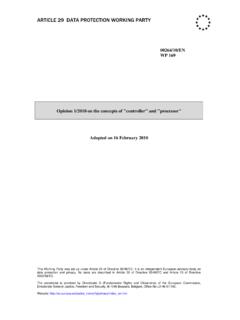Transcription of SUPREME COURT OF THE UNITED STATES
1 1 (Slip opinion ) OCTOBER TERM, 2020 Syllabus NOTE: Where it is feasible, a syllabus (headnote) will be released, as is being done in connection with this case, at the time the opinion is issued. The syllabus constitutes no part of the opinion of the COURT but has been prepared by the Reporter of Decisions for the convenience of the reader. See UNITED STATES v. Detroit Timber & Lumber Co., 200 U. S. 321, 337. SUPREME COURT OF THE UNITED STATES Syllabus NESTLE USA, INC. v. DOE ET AL. CERTIORARI TO THE UNITED STATES COURT OF APPEALS FOR THE NINTH CIRCUIT No. 19 416. Argued December 1, 2020 Decided June 17, 2021* Respondents are six individuals from Mali who allege that they weretrafficked into Ivory Coast as child slaves to produce cocoa. U.
2 Companies Nestl USA, Inc., and Cargill, Inc., do not own or operate cocoa farms in Ivory Coast, but they do buy cocoa from farms located there and provide those farms with technical and financial sued Nestl , Cargill, and others under the Alien Tort Statute (ATS) which provides federal courts jurisdiction to hearclaims brought by an alien for a tort only, committed in violation ofthe law of nations or a treaty of the UNITED STATES , 28 U. S. C. 1350 contending that this arrangement aids and abets child slavery. Be-cause respondents injuries occurred overseas and the only domesticconduct alleged by respondents was general corporate activity, the Dis-trict COURT dismissed the suit as an impermissible extraterritorial ap-plication of the ATS under Kiobel v. Royal Dutch Petroleum Co., 569 U. S. 108. The Ninth Circuit held, as relevant, that respondents had pleaded a domestic application of the ATS, as required by Kiobel, be-cause the corporations major operational decisions originated in the UNITED STATES .
3 Held: The judgment is reversed, and the case is remanded. 929 F. 3d. 623, reversed and remanded. JUSTICE THOMAS delivered the opinion of the COURT with respect to Parts I and II, concluding that respondents here improperly seek ex-traterritorial application of the ATS. The COURT s two-step framework for analyzing extraterritoriality issues first presumes that a statute * Together with No. 19 453, Cargill, Inc. v. Doe et al., also on certiorari to the same COURT . 2 NESTLE USA, INC. v. DOE Syllabus applies only domestically and asks whether the statute gives a clear, affirmative indication that rebuts the presumption. RJR Nabisco, Inc. v. European Community, 579 U. S. 325, 337. As the COURT has already held, the ATS does not rebut the presumption of domestic ap-plication.
4 Kiobel, 569 U. S., at 124. In fact, the ATS does not expressly regulate conduct at all, much less evince a clear indication of extra-territoriality. Id., at 115 118. Second, where the statute, as here, does not apply extraterritorially, plaintiffs must establish that the conduct relevant to the statute s focus occurred in the UNITED STATES .. even if other conduct occurred abroad. RJR Nabisco, 579 U. S., at 337. The parties dispute what conduct is relevant to the focus of the ATS, but even if this dispute were resolved in respondents favor, their complaint would impermissibly seek extraterritorial application of theATS. Nearly all the conduct they allege aided and abetted forced la-bor providing training, equipment, and cash to overseas farmers occurred in Ivory Coast. Pleading general corporate activity, like mere corporate presence, Kiobel, 569 U.
5 S., at 125, does not draw a sufficient connection between the cause of action respondents seek anddomestic conduct. To plead facts sufficient to support a domestic ap-plication of the ATS, plaintiffs must allege more domestic conduct than general corporate activity common to most corporations. Pp. 3 5. THOMAS, J., announced the judgment of the COURT and delivered the opinion of the COURT with respect to Parts I and II, in which ROBERTS, C. J., and BREYER, SOTOMAYOR, KAGAN, GORSUCH, KAVANAUGH, and BAR-RETT, JJ., joined, and an opinion with respect to Part III, in which GOR-SUCH and KAVANAUGH, JJ., joined. GORSUCH, J., filed a concurring opin-ion, in which ALITO, J., joined as to Part I, and in which KAVANAUGH, J., joined as to Part II. SOTOMAYOR, J., filed an opinion concurring in partand concurring in the judgment, in which BREYER and KAGAN, JJ.
6 , joined. ALITO, J., filed a dissenting opinion . _____ _____ Cite as: 593 U. S. ____ (2021) 1 opinion of the COURT NOTICE: This opinion is subject to formal revision before publication in the preliminary print of the UNITED STATES Reports. Readers are requested to notify the Reporter of Decisions, SUPREME COURT of the UNITED STATES , Wash-ington, D. C. 20543, of any typographical or other formal errors, in order that corrections may be made before the preliminary print goes to press. SUPREME COURT OF THE UNITED STATES Nos. 19 416 and 19 453 NESTLE USA, INC., PETITIONER 19 416 v. JOHN DOE I, ET AL. CARGILL, INC., PETITIONER 19 453 v. JOHN DOE I, ET AL. ON WRITS OF CERTIORARI TO THE UNITED STATES COURT OF APPEALS FOR THE NINTH CIRCUIT [June 17, 2021] JUSTICE THOMAS announced the judgment of the COURT and delivered the opinion of the COURT with respect to Parts I and II, and an opinion with respect to Part III, in which JUSTICE GORSUCH and JUSTICE KAVANAUGH join.
7 The Alien Tort Statute (ATS) gives federal courts juris-diction to hear certain civil actions filed by aliens. 28 U. S. C. 1350. Although this jurisdictional statute does not create a cause of action, our precedents have stated that courts may exercise common-law authority under this stat-ute to create private rights of action in very limited circum-stances. See, , Sosa v. Alvarez-Machain, 542 U. S. 692, 724 (2004); Hern ndez v. Mesa, 589 U. S. ___, ___, ___ (2020) (slip op., at 6, 14). Respondents here seek a judicially created cause of action to recover damages from American corporations that allegedly aided and abetted slavery abroad. Although respondents injuries occurred entirely 2 NESTLE USA, INC.
8 V. DOE opinion of the COURT overseas, the Ninth Circuit held that respondents could sue in federal COURT because the defendant corporations alleg-edly made major operational decisions in the UNITED STATES . The Ninth Circuit erred by allowing this suit to pro-ceed. I According to the operative complaint, Ivory Coast a West-African country also known as C te d Ivoire is re-sponsible for the majority of the global cocoa supply. Re-spondents are six individuals from Mali who allege that they were trafficked into Ivory Coast as child slaves to pro-duce cocoa. Petitioners Nestl USA and Cargill are U. S. -based com-panies that purchase, process, and sell cocoa. They did not own or operate farms in Ivory Coast. But they did buy cocoa from farms located there. They also provided those farms with technical and financial resources such as training, fertilizer, tools, and cash in exchange for the exclusive right to purchase cocoa.
9 Respondents allege that they were enslaved on some of those farms. Respondents sued Nestl , Cargill, and other entities, con-tending that this arrangement aided and abetted child slav-ery. Respondents argue that petitioners knew or should have known that the farms were exploiting enslaved chil-dren yet continued to provide those farms with resources. App. 319. They further contend that petitioners had eco-nomic leverage over the farms but failed to exercise it to eliminate child slavery. And although the resource distri-bution and respondents injuries occurred outside the UNITED STATES , respondents contend that they can sue in federal COURT because petitioners allegedly made all major operational decisions from within the UNITED STATES . The District COURT dismissed this suit after we held that the ATS does not apply extraterritorially.
10 Kiobel v. Royal Dutch Petroleum Co., 569 U. S. 108 (2013). It reasoned that 3 Cite as: 593 U. S. ____ (2021) opinion of the COURT respondents sought to apply the ATS extraterritorially be-cause the only domestic conduct alleged was general corpo-rate activity. While this suit was on appeal, we held that courts cannot create new causes of action against foreign corporations under the ATS. Jesner v. Arab Bank, PLC, 584 U. S. ___ (2018). The Ninth Circuit then reversed the Dis-trict COURT in part. Although the Ninth Circuit determined that Jesner compelled dismissal of all foreign corporate de-fendants, it concluded that the opinion did not foreclose ju-dicial creation of causes of action against domestic corpora-tions.
